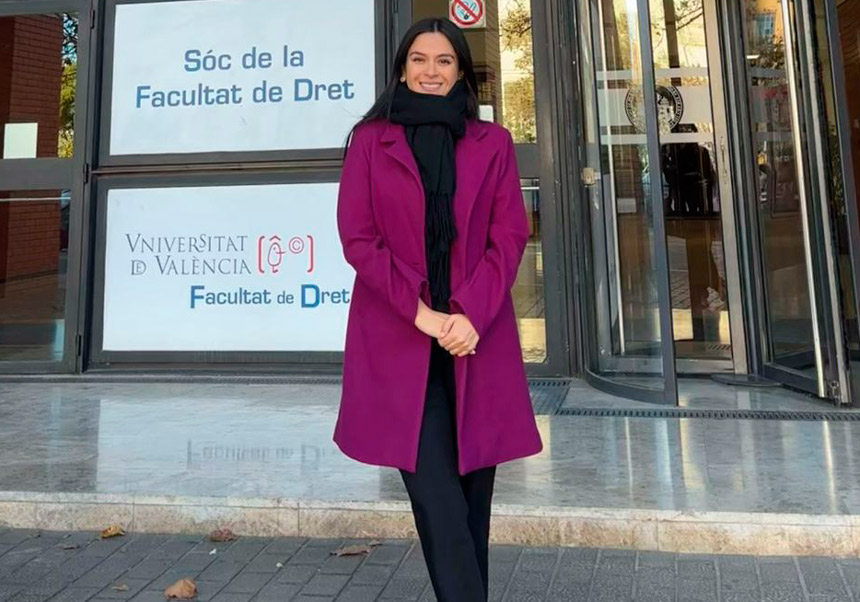
Lizz Dahiam Pacheco Ramírez, student of the Master's Degree in Law, Business and Justice at the Universitat de València, successfully defended her TFM on Monday 19 September on the legal tools available to consumers to defend their rights. Dr. Carlos EspluguesMota was the teacher in charge of tutoring the work.
21 september 2016
The work Effective judicial protection: a look at the tools that consumers have for defending their rights consists of four chapters divided as follows:
- Chapter 1: Reality of Consumption in Colombia
- Chapter 2: Pathways or tools for the protection of consumer rights
- Chapter 3: Effective judicial protection in consumer protection actions
- Chapter 4: Proposals
Chapter 1
In the first chapter, the sectors of the economy in which consumers are most dissatisfied will be presented. To this end, taking into account the types of consumers, we will deal with the health sector, the financial sector, telecommunications, aeronautics and a general sector, which includes goods and services in which there is no special regulation. It will also explain the notion of consumer, with respect to which it is emphasized as a special component that the good or service is not linked to the economic activity of the subject that acquires; in the same sense, the definitions of producer and supplier and product in Colombian law will be indicated.
Chapter 2
In the second chapter, in view of the fact that the consumers' expectations regarding the products they purchase are infringed, the different ways or tools that users have for the protection of their rights will be explained. In this regard, there are three channels, one of an administrative nature, another of a judicial nature and a final one, typical of alternative dispute resolution methods; the first is the responsibility of the Superintendency of Industry and Commerce (SIC) and the country's municipalities, in the exercise of the inspection, surveillance and control functions granted to the executive branch, in which sanctions are pursued against the businessman, without generating payments in favour of the consumer.
The second way corresponds to the judicial spring, of which the judges of the Republic and the administrative authorities with jurisdictional functions have jurisdiction; this second way, with the Consumer Statute (EC), contemplates three jurisdictional actions recognized as popular and group actions, with which the collective interests are protected:
- The product liability action which seeks to repair the damage caused to the health and life of consumers by the defects in the products;
- The consumer protection action in which contentious matters based on the violation of users' rights are decided;
- The alternative methods of conflict resolution, such as conciliation, mediation and arbitration, being the first, the most used by users insofar as it has greater legal regulation and trust in citizens.
Chapter 3
A third chapter will indicate the pertinence of the right to effective judicial protection, with special reference to consumer protection actions. To this end, the characteristics of this right will be addressed in the light of Colombian constitutional jurisprudence; Likewise, the problems that are arising with the consumer protection action enshrined in the EC will be indicated, that is to say, the excessive demand for service in the administration of justice in consumer protection litigation, the manifest ritual excess, the delay in processing, the lack of equality in the procedural step, the lack of legal indication regarding the procedure for imposing fines to be imposed for non-compliance with the sentences established in article 58 numeral 11 of the EC.
It will also indicatewhat are the advantages of going to the administrative authorities vested with jurisdictional functions in the resolution of disputes involving a consumer.
Chapter 4
The last chapter corresponds to an outline of proposals, which raises the need to generate a culture of complaint prior to suit, which avoids resorting to unnecessary lawsuits, also, the importance of citizens in the framework of consumer relations, instead of resorting to the administrative channel that only generates sanctions for the employer or resort to the judicial channel, that in itself is more delayed, more formalistic and instead, consumers decide to resort to alternative methods for the solution of conflicts such as mediation and why not have a consolidated consumer arbitration as the Basque Country has it, given that they are mechanisms more in line with the expectations of users in the pursuit of the satisfaction of their rights.
Finally, a modification to the existing judicial process was proposed for such action to make it shorter and more effective.














